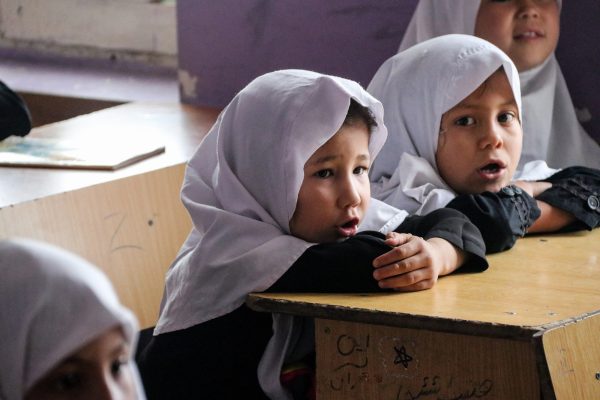Taliban Leaders Cross Borders While Afghan Women Can’t Cross Their Doorsteps: 5 Steps to End This Injustice
By Murwarid Ziayee and Lauryn Oates
Copyright thediplomat

September 19 marks four years since Afghan girls were barred from secondary schooling in Afghanistan. What began as a “temporary measure” in September 2021 has hardened into the most systematic denial of women’s and girls’ right to education anywhere in the world. Nearly 1.5 million Afghan girls are now locked out of classrooms beyond grade six, and Afghan women are barred from universities, teacher training, health and medical education, and most vocational institutes. The consequences are devastating. UNICEF warned that denying girls an education could cost Afghanistan up to $5.4 billion in lost GDP annually, a devastating figure in a country where more than 97 percent of people already live in poverty and where acute malnutrition rates are soaring. Beyond economic calamity, the ban entrenches intergenerational cycles of illiteracy, leaving Afghan children without mothers who can read, write, or support their learning. It will also cause the country to rapidly face a shortage of graduates trained for skilled jobs, which will only worsen the country’s pressing development problems. The Taliban’s gender apartheid is not limited to schooling. Since returning to power, they have issued over 100 edicts restricting women’s freedoms, banning them from most jobs, closing public spaces, and mandating male guardianship. The U.N. Special Rapporteur on Human Rights in Afghanistan has called this institutionalized, systematic oppression that may amount to crimes against humanity under the Rome Statute. Yet despite these findings, international responses haven’t reflected the scale of this deadly human rights crisis. In practice, this has amounted to a shameful condonement that the Taliban have exploited. Instead of further isolation, they are enjoying greater engagement with other countries than ever before. The world is long overdue for concerted diplomatic cooperation and policy against the Taliban that is anchored in the expansion and enforcement of strict sanctions. There are five key steps the world can take to use sanctions more effectively and host a unified, global effort to hold the Taliban accountable: First, U.N. and states’ own sanctions lists should be expanded to include the full gamut of Taliban leaders, and impose an absolute travel ban, which should be duly enforced. A mere 135 Taliban members are currently subject to sanctions. As a result, Taliban representatives frequently travel internationally not only to friendly countries like China and Russia, but also more broadly, to countries like Norway and Germany. Enforcement of even these limited sanctions is lackluster. Sanctioned Taliban members have been issued exemptions by the U.N. to travel, such as when acting Foreign Minister Amir Khan Muttaqi, the head of Afghanistan’s central bank Abdul Baqi Bashir Abdul Shah, and former acting Finance Minister Hedayatullah Badri traveled to Turkiye in 2023 for medical reasons. These sanctioned individuals are among those responsible for preventing women from sitting medical exams. They have upheld the ban on female education that was expanded in 2024 to include medical and health education, making many medical procedures unavailable within Afghanistan, particularly for women, and fueling a healthcare crisis. In the devastating August 31 earthquake in eastern Afghanistan, women were left to die, trapped in rubble, because the Taliban refused to allow male aid workers or healthcare personnel to go near women. The U.N.’s compassionate treatment of Taliban leaders seeking the luxury of medical treatment abroad stands in disturbing contrast to the inhumane response of the group to women’s medical needs at home. The second step in creating a unified global response is ensuring that countries do not welcome Taliban diplomatic representatives, thereby signaling non-recognition of their regime and reinforcing political isolation. Initially, after the August 2021 takeover, most Afghan embassies remained under the control of representatives of the Afghan Republic. Gradually, dozens of embassies – such as those in Germany, the Netherlands, Spain, Bulgaria, Czechia, Iran, Uzbekistan, and Pakistan – have been handed over to the Taliban while those in the United States, the United Kingdom, Norway, and India have shut down. Russia formally recognized the Taliban, and China and other states host Taliban appointed ambassadors, thereby signaling to the Taliban that their actions are acceptable. Third, besides improving the U.N. sanctions regime, states can individually introduce sanctions through Magnitsky-style acts, which already exist in many countries and can be expanded to include individual Taliban figures. State-specific sanctions signal a firm stance that human rights violators are unwelcome in the international community. The fourth step is to establish robust monitoring mechanisms over humanitarian aid flows to prevent the Taliban from benefiting, indirectly funding their repressive governance. Until gender apartheid is dismantled and the right to education for all women and girls in Afghanistan is fully restored, all aid should bypass Taliban-controlled governmental institutions. Lastly, states should support efforts to classify the Taliban’s policies, including the ban on female education, as gender apartheid under international law. Governments should individually and unambiguously state support for the inclusion of gender apartheid as a crime against humanity in the draft Crimes Against Humanity Convention before the United Nations, joining the other states that have already signaled their support. Member states should push for a formal U.N. General Assembly resolution recognizing the Taliban’s policies, including the gender discriminatory restrictions on education, as gender apartheid. These measures will not instantly reopen schools and restore women’s rights, but they signal that the world sees Afghan girls and women, and that their dreams, their education, and their futures matter. Humanitarian relief alone is not enough; without pressure, the Taliban will continue to be enabled by the international community in their perpetration of gender apartheid, and at a devastating human cost. The Taliban must face consequences. Sanctions are a tool to show an internationally united stance that denying millions of girls and women the right to learn is illegal, harmful, and intolerable to the world. These sanctions, paired with direct support for organizations delivering alternative forms of education, are pathways to restoring rights and ensuring that girls and women continue to learn outside the formal system that has barred them. Four years of inaction threaten to normalize the Taliban’s war on women and girls. Every additional year out of school makes it less likely that Afghan girls will ever return. If we do nothing, gender apartheid will define Afghanistan for generations.



